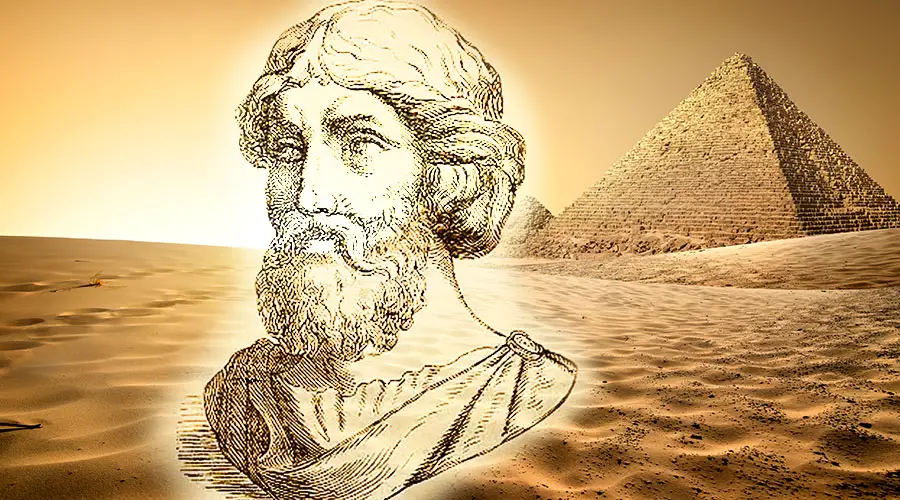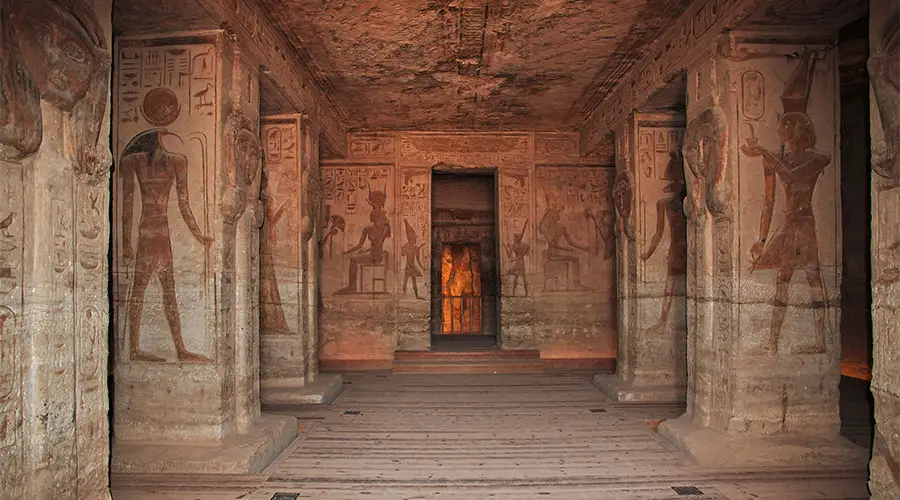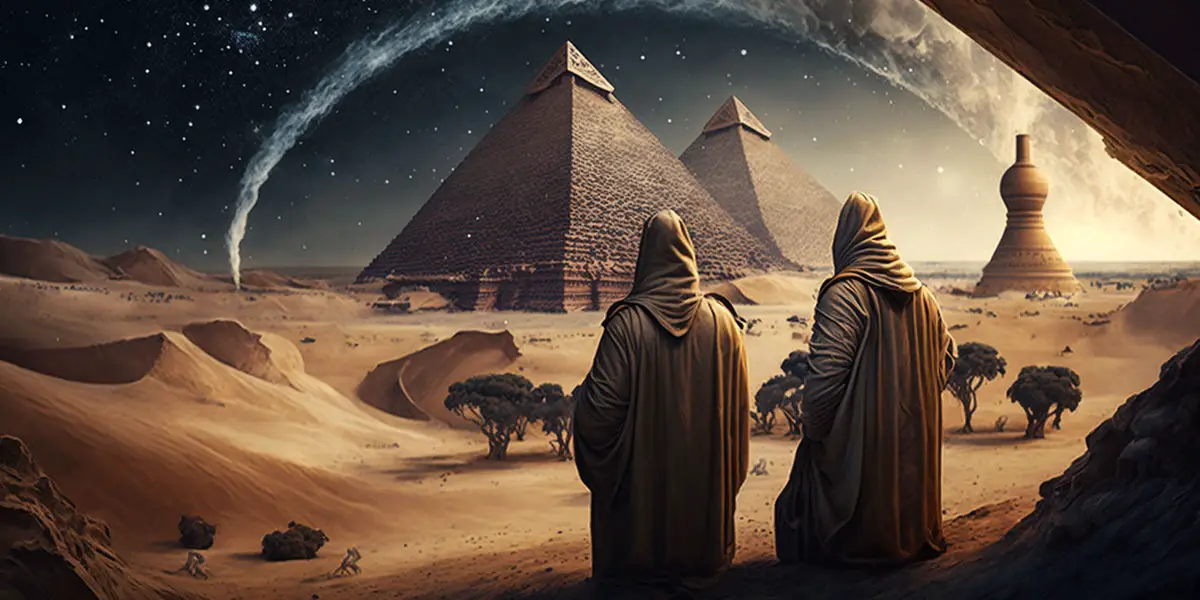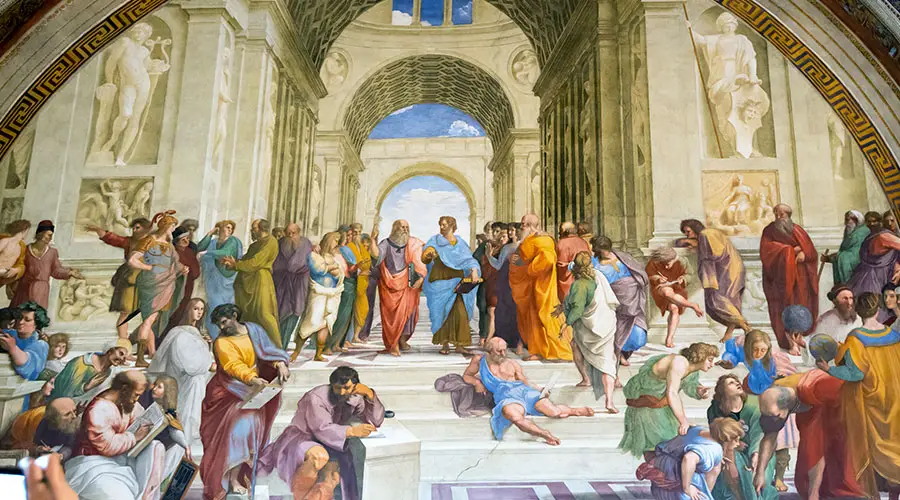Pythagoras is one of the most important philosophers in history, and was heavily influenced by the ancient Egyptians, as he travelled there early in his life.
Pythagoras the ancient Greek philosopher traveled to Egypt to study with the priests of the ancient Egyptian mystery schools. He was initiated into the secret knowledge, including math, astronomy, alchemy, and magic. He was significantly influenced by Egyptian esoteric thought.
During his time in Egypt, he became a master of the arts of astronomy, geography and metaphysics. It is believed that in total he spent 22 years there, followed by 12 in Babylon, were he studied music and magic.

Pythagoras went to Egypt as a Young Man
Pythagoras was born on the island of Samos in 569 BC. As a young man he moved to the nearby city of Myletus, in order to study with the philosopher Thales. Thales advised his young pupil to travel to Egypt and study in the renowned mystery schools there.
At the time, the Egyptian cities of Heliopolis, Memphis, and Thebes were in particular homes of famous mystery schools. According to the Neoplatonic philosopher Porphyry (233-305 AD in Life of Pythagorus, Pythagoras was at first rejected from entering the schools. He persisted and had another Greek named Polycrates of Samos to write a letter to the Amasis the king of Egypt, requesting his admission. Eventually he was admitted, and went on to win their respect and admiration.
Sources of Information on His Travels in Egypt
There are several ancient sources that mention Pythagoras’ travels to Egypt, but they are not always in agreement and some are more credible than others. The most important sources of information on Pythagoras’ time in Egypt are:
Writings of Philolaus of Crotona: Philolaus was a pupil of Pythagoras and one of his earliest biographers. He wrote about Pythagoras’ travels to Egypt and other countries, but his works are lost and only fragments have survived.
Writings of Iamblichus of Chalcis: Iamblichus was a Neoplatonist philosopher who wrote a biography of Pythagoras in the 3rd century CE. In his work, Iamblichus mentions Pythagoras’ travels to Egypt and the knowledge he gained there.
Writings of Diogenes Laertius: Diogenes Laertius was a biographer of Greek philosophers who lived in the 3rd century CE. In his work “Lives and Opinions of Eminent Philosophers,” he includes a section on Pythagoras, in which he mentions his travels to Egypt.
Writings of Porphyry of Tyre: Porphyry was a Neoplatonist philosopher who wrote a biography of Pythagoras in the 3rd century CE. In his work, he mentions Pythagoras’ travels to Egypt and the influence of Egyptian mathematics and philosophy on his later teachings.
The Priests and Mystery Schools of Ancient Egypt
The priests of ancient Egypt were keepers of a great and powerful knowledge. There knowledge was inherited from the earlier advanced civilization of Atlantis, as well as from their gods, in particular Thoth, who taught them writing and much more.
They possessed advanced knowledge of healing the sick, foreseeing the future, to control the elements of nature through their mastery of magic and alchemy. Learn more about alchemy here.

The schools were occupied by priests, who initiated individuals into the secret wisdom and knowledge of the civilization. These schools taught a variety of subjects, including mathematics, astronomy, geometry, metaphysics, and spirituality. Learn more about the philosophy of ancient Egypt, including the meaning of the ankh symbol, by clicking here.
The mystery schools of ancient Egypt were centers of spiritual awakening, where individuals were able to access higher states of consciousness and attain a deeper understanding of their true nature. The teachings of the mystery schools have been passed down through the ages and contain the key to unlocking the mysteries of the universe and our place within it.
The Magick and Alchemy of Ancient Egypt
The priests of ancient Egypt practiced a form of magic that was based on their understanding of the natural laws of the universe. This magic involved the manipulation of energy and consciousness to achieve specific goals or outcomes.
The priests of ancient Egypt were masters of energy work, and used their knowledge of the energy systems of the body and the universe to heal the sick, communicate with the gods, and perform other magical feats.

The priests of ancient Egypt had a deep understanding of the geometry of the universe and used this knowledge to create powerful symbols and talismans that could be used for magical purposes. To learn more about sacred geometry click here.
Pythagoras in Babylon
After spending 22 years in Egypt, Pythagorus then relocated to Babylon in 525 BC. This occurred as a result of Egypt being conquered by the Persians, who then deported the Academic class of Egyptians to Babylon. In Babylon he was studied math and music, and was exposed to magic, as a tradition and order of Magi was present in Babylon society.
After 12 years in Babylon, Pythagoras then returned to Samos, his birthplace in Greece, at the age of 56.
The Legacy and Contributions of Pythagoras
His stay in Samos was short-lived, as he quickly moved to Italy, where he went on to found a mystery school, and formulate the teachings that would change the world, and he would become remembered for.
The mystery school that he founded in Italy was very elite, consisted of male and female members, and were called the Mathematikoi. Similar to the practices of the Egyptian and Babylion schools in which he learned, they practiced strict secrecy.
The group only communicated their philosophy orally, and Pythagorus never wrote anything down. Most of what is known of his philosophy comes from the later writings of Plato, who studied and wrote about Pythagorus.
One of Pythagoras’ main ideas was that numbers and mathematics were at the root of the universe and that everything in the world could be understood and explained through numbers. He is credited with discovering the famous Pythagorean Theorem, which states that in a right-angled triangle, the square of the length of the hypotenuse is equal to the sum of the squares of the other two sides. Although it has been pointed out the Pythagorean Theorem can be found in the designs of the Egyptian pyramids, which supports the idea that he was educated in Egypt.
Pythagoras also had a strong belief in the idea of reincarnation and the immortality of the soul. He taught that the soul was trapped in the physical world and that it was the goal of individuals to free themselves from this cycle of rebirth through spiritual enlightenment. He believed in the existence of a divine, universal harmony and that the key to unlocking this harmony was through purification of the soul and living a virtuous life.
His teachings were hugely influential on all later Greek philosophers to come, including Socrates, Plato, and Aristotle. To learn more about the contributions of ancient Greek philosophy schools click here.

Pythagoras is remembered for his contributions to mathematics, as well as his influence on the development of Western philosophy, particularly in the areas of ethics, metaphysics, and spirituality. His ideas continue to be studied and debated to this day, and he remains an important figure in the history of Western thought.
Recommended Reading
If you want to continue exploring this subject more deeply, you can see which books I recommend by clicking here.

